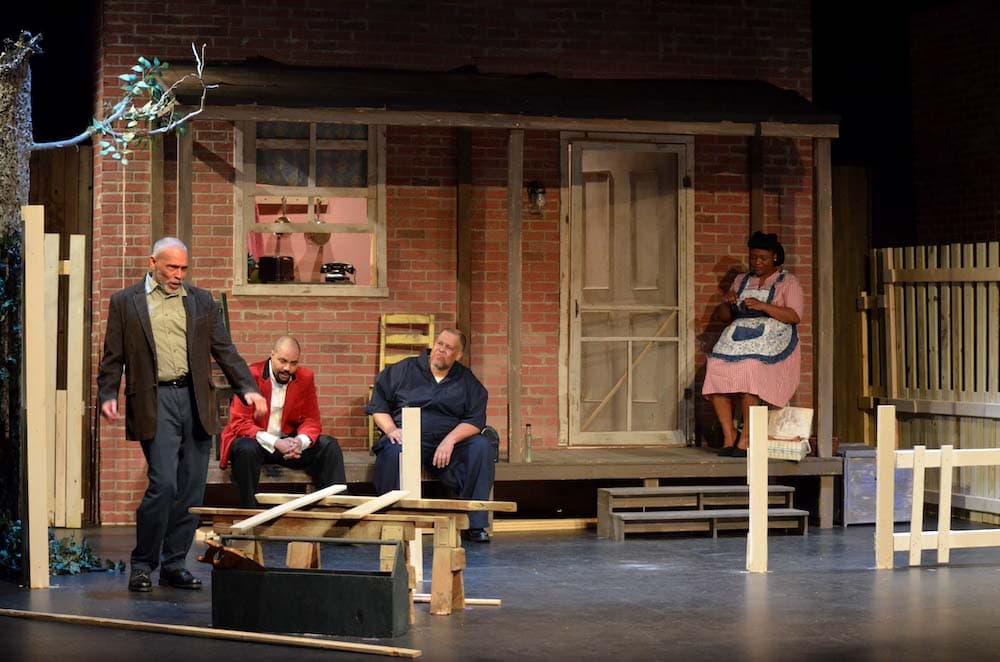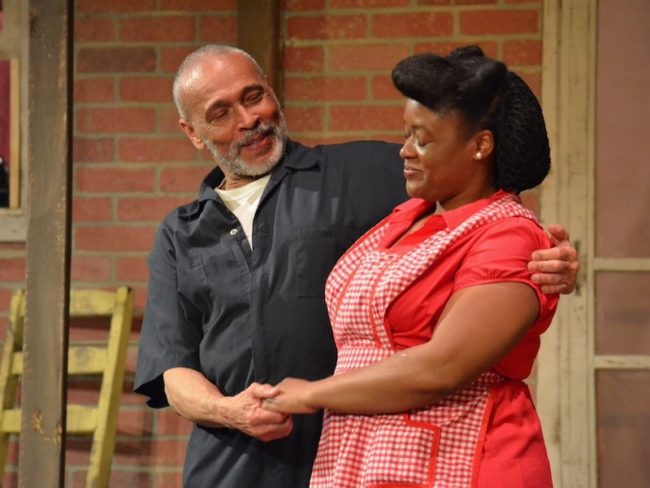As I watched this long-awaited production of August Wilson’s Fences from the Bowie Community Theatre (it was set to open in March 2020 before life got so much more… interesting), I couldn’t help recalling lines from Philip Larkin’s “This Be the Verse”:
They f*ck you up, your mum and dad.
They may not mean to, but they do.
They fill you with the faults they had
And add some extra, just for you.
But they were f*cked up in their turn…
While Wilson and Larkin were separated by an ocean during their lifetimes, the two men demonstrated an understanding of the traumas that parents can pass down to their children and through generations. In her skillful treatment of this layered story about one African-American family in 1950s Pittsburgh, Director Nicole Mullins-Teasley shows herself— at least from an artistic standpoint! – to have a meaningful comprehension of the nature of intergenerational trauma as well.

Unlike more plot-driven fare, the “action” in Fences is limited to conversations that take place over several Fridays and Saturdays in a single location. The set – which exclusively consists of the Maxson family’s front yard, house, and surrounding fencing – is on par with the excellence we’ve come to expect from Bowie Community Theatre, in that it feels as if Daniel Lavanga (set designer), Penni Barnett (set dresser), and the rest of the set construction crew have actually built a house atop the playhouse’s elevated stage. Even as characters chat on the lawn, we see others maneuvering in the kitchen through the front window and still others seeming to disappear down hallways or around corners within the building, with appropriate sound effects from within (kudos to sound designer Fred Nelson) like ringing telephones to supplement the illusion of depth. And that front lawn – it’s about as close to the best of all possible theatrical front lawns as one could want, with details that include its fence in various states of construction, the wood and tools required for the fence’s evolution, and even the pitch-height ball suspended from an overhanging branch that the Maxson men use for batting practice from time to time. I also appreciated how just how much those background elements themselves seemed like characters in the play and were – like the stories unfolding on stage – well relevant to the current events and simultaneously somehow intertwined with the characters’ pasts and futures.
Speaking of those characters – the ones played by humans, I mean – the cast of Fences boasts some of the most impressive chemistry I’ve ever seen in a stage production. As patriarch Troy Maxson, Louis B. Murray is at once larger-than-life and instantly familiar (at least to those of us who had a limelight-loving dad or uncle prone to telling stories of an alternatively factual bent). Whereas one can imagine a production where the audience puzzled at all of the attention Troy receives, Murray’s complex portrayal shows precisely why his character is so widely loved and admired even as he nurses deep wounds and character flaws that decidedly complicate his relationships to those closest to him. Meanwhile, as Jim Bono, Troy’s co-worker and best friend, Tillmon Figgs puts in a warm and largely subdued performance that expertly complements Murray’s brasher portrayal: for every grand gesture and over-the-top story by Murray, Figgs is there with amusement and admiration – and occasionally measured criticism and advice – for a man who’s long crossed the line between “friend” and “family.” That the deep love between the two men is evident even amidst the tensions between them is a testament to the work Murray and Figgs have done to flesh out these characters.

In terms of work, and as the only adult woman in the play, JoAn Monplaisir also has a fair bit of heavy lifting to do. Like Bono, Rose Maxson largely stays within the shadow of her husband Troy, often reduced to a bystander as he spins his yarns and struts around his yard. Yet since she has just as much investment in the running of the household as Troy, she must cross him more frequently and with significantly more care than his longtime friend. Accordingly, Monplaisir’s performance is among the most nuanced in the production, especially when coupled with the moments when Rose speaks her mind and describes how she’s given up for Troy and her family – moments rendered all the more poignant by her (and our) knowledge of Troy’s inability to fully acknowledge the depth of her sacrifices.
Several other excellent performances add further life to the Maxson household. As Corey, son of protagonist Troy, Denzell Massenburg effectively captures both the youthful optimism of his character and those jarring moments when those rose-tinted windows begin to crack beneath the hammers of familial strife. By contrast, Shawn Armwood Sr.’s performance is remarkable for its apparent simplicity: as Troy’s brother Gabriel, a World War II veteran impaired by brain damage, he brings an aptly childlike enthusiasm to the role, though even here there are choice moments when the character’s exuberance give way to his frustration at being unable to grasp the complexities of his surroundings. And as Raynell, who is born during the play’s action but appears in the final scene as an eight-year-old girl, Ava Brown compellingly models the range of emotions of a young child encountering her big brother for the first time since infancy.
(I regret that I cannot comment on Mack Leamon’s performance as Lyons Maxson – though if the direction and actors I did see are any indication, he too will be stellar – as Ryan Willis occupied the role during the play’s opening weekend. Willis brought an ease and affability to his character that made his rarer appearances some of the most memorable and humorous moments of the play. If Leamon is even half as delightful, you’re in for a real treat.)

Yet while I could continue to heap praise upon this production (and the incredible resilience of a cast and crew that remained committed to this performance even two years after the original opening date!), the text renders BCT’s Fences even more than the sum of its marvelous components. While there have been many African-American playwrights and actors who have sought to convey the essential humanity of black folks through theatre, these portrayals — and especially treatments as thoughtful and sympathetic as August Wilson’s here — are still arguably less easy to come by than they should be. Here, no one character was expected to be representative of their “people.” The casual yard setting enabled the characters to be fully themselves, strengths, and shortcomings and all, without fear of judgment from white onlookers and overseers (though the characters did describe having had such encounters elsewhere). Moreover, as someone quite used to the experience of being the only black actor in a production or the lone black face in an audience, I found watching a cast of black actors in a room of majority-black patrons to be an interesting and somehow encouraging experience: while I maintain that DEI efforts are still very much needed, this show felt like a resounding triumph over the historical and surviving barriers to inclusion and acceptance that African Americans have faced in the arts. (I nevertheless urge non-black readers to dismiss any fears of intruding upon a safe space and give Fences a viewing: all ticketholders are welcome at a theatrical production, and there are additional benefits you might derive from seeing a show in this context that you might not easily acquire elsewhere.)
That said, given its focus on honest character portrayals, Wilson’s script defies easy interpretation. Doubtless some audience members will come away convinced that it has one meaning; others will draw different conclusions. I certainly have my own takeaways. In the end, though, Fences is a story about people. We live, we die, and along the way we laugh and love and probably inflict more pain than we mean to — but we do the best we can. Sometimes our best isn’t enough, and we should reject the impulse to elide our failings with a casual acknowledgment of our having tried: too often that approach suggests a carelessness and lack of consideration that borders on cruelty. Even so, in its most moving scenes, Fences is an argument for viewing others through an empathetic lens in spite of their failings. I am also tempted to describe Fences as an argument for love – but, for good or ill, I’m not sure Wilson thinks we have much choice on that front.
Running Time: Approximately 2 hours and 15 minutes with one intermission
Fences plays through April 24, 2022 with Bowie Community Theatre in residence at The Bowie Playhouse— 16500 White Marsh Park Drive in Bowie, MD. For tickets please call the box office at 301-805-0219 or purchase them in advance online.
